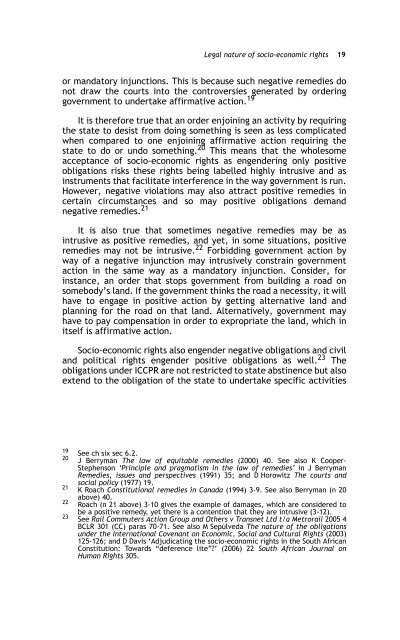LITIGATING SOCIO-ECONOMIC RIGHTS IN SOUTH AFRICA - PULP
LITIGATING SOCIO-ECONOMIC RIGHTS IN SOUTH AFRICA - PULP
LITIGATING SOCIO-ECONOMIC RIGHTS IN SOUTH AFRICA - PULP
Create successful ePaper yourself
Turn your PDF publications into a flip-book with our unique Google optimized e-Paper software.
Legal nature of socio-economic rights 19<br />
or mandatory injunctions. This is because such negative remedies do<br />
not draw the courts into the controversies generated by ordering<br />
government to undertake affirmative action. 19<br />
It is therefore true that an order enjoining an activity by requiring<br />
the state to desist from doing something is seen as less complicated<br />
when compared to one enjoining affirmative action requiring the<br />
state to do or undo something. 20 This means that the wholesome<br />
acceptance of socio-economic rights as engendering only positive<br />
obligations risks these rights being labelled highly intrusive and as<br />
instruments that facilitate interference in the way government is run.<br />
However, negative violations may also attract positive remedies in<br />
certain circumstances and so may positive obligations demand<br />
negative remedies. 21<br />
It is also true that sometimes negative remedies may be as<br />
intrusive as positive remedies, and yet, in some situations, positive<br />
remedies may not be intrusive. 22 Forbidding government action by<br />
way of a negative injunction may intrusively constrain government<br />
action in the same way as a mandatory injunction. Consider, for<br />
instance, an order that stops government from building a road on<br />
somebody’s land. If the government thinks the road a necessity, it will<br />
have to engage in positive action by getting alternative land and<br />
planning for the road on that land. Alternatively, government may<br />
have to pay compensation in order to expropriate the land, which in<br />
itself is affirmative action.<br />
Socio-economic rights also engender negative obligations and civil<br />
and political rights engender positive obligations as well. 23 The<br />
obligations under ICCPR are not restricted to state abstinence but also<br />
extend to the obligation of the state to undertake specific activities<br />
19 See ch six sec 6.2.<br />
20<br />
J Berryman The law of equitable remedies (2000) 40. See also K Cooper-<br />
Stephenson ‘Principle and pragmatism in the law of remedies’ in J Berryman<br />
Remedies, issues and perspectives (1991) 35; and D Horowitz The courts and<br />
social policy (1977) 19.<br />
21 K Roach Constitutional remedies in Canada (1994) 3-9. See also Berryman (n 20<br />
above) 40.<br />
22<br />
Roach (n 21 above) 3-10 gives the example of damages, which are considered to<br />
be a positive remedy, yet there is a contention that they are intrusive (3-12).<br />
23 See Rail Commuters Action Group and Others v Transnet Ltd t/a Metrorail 2005 4<br />
BCLR 301 (CC) paras 70-71. See also M Sepúlveda The nature of the obligations<br />
under the International Covenant on Economic, Social and Cultural Rights (2003)<br />
125-126; and D Davis ‘Adjudicating the socio-economic rights in the South African<br />
Constitution: Towards “deference lite”?’ (2006) 22 South African Journal on<br />
Human Rights 305.
















